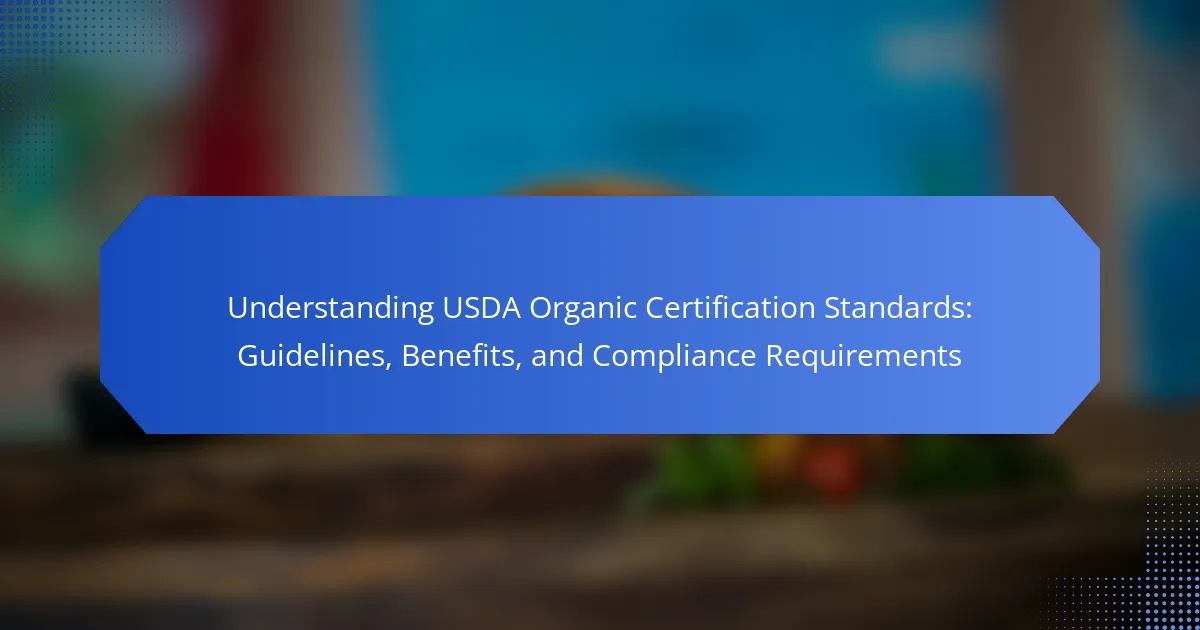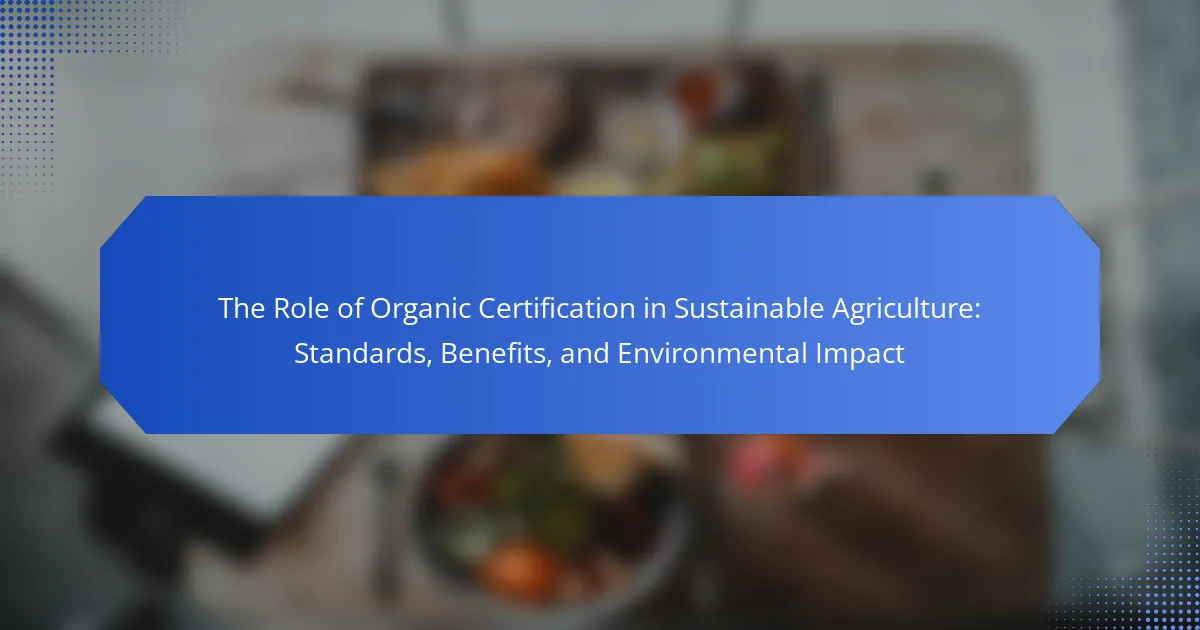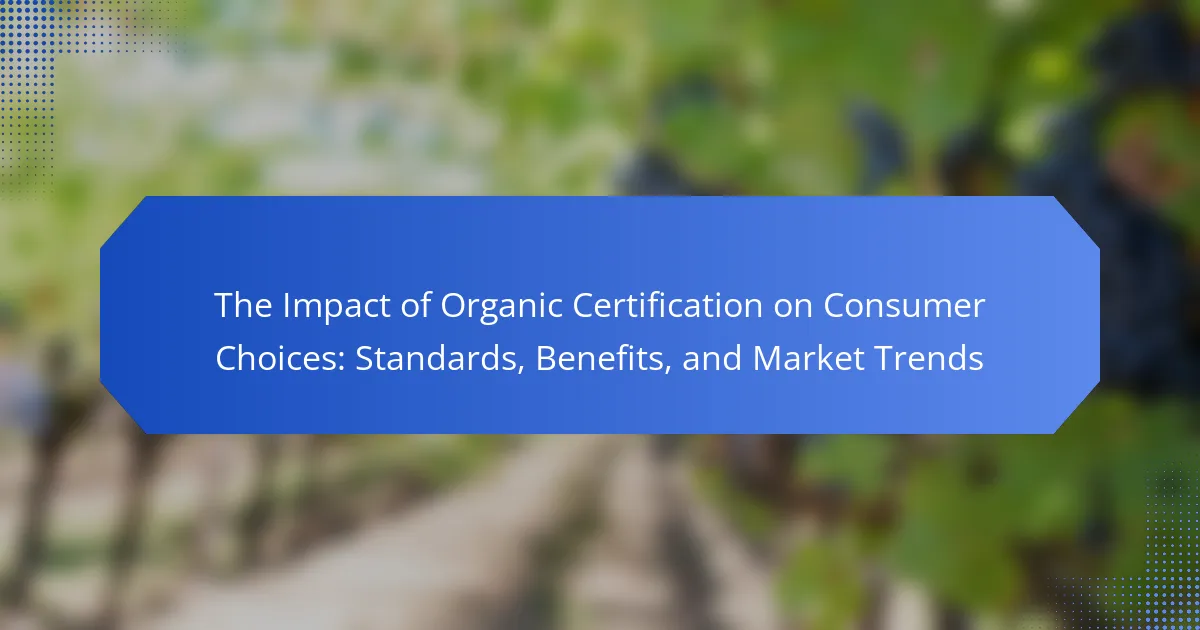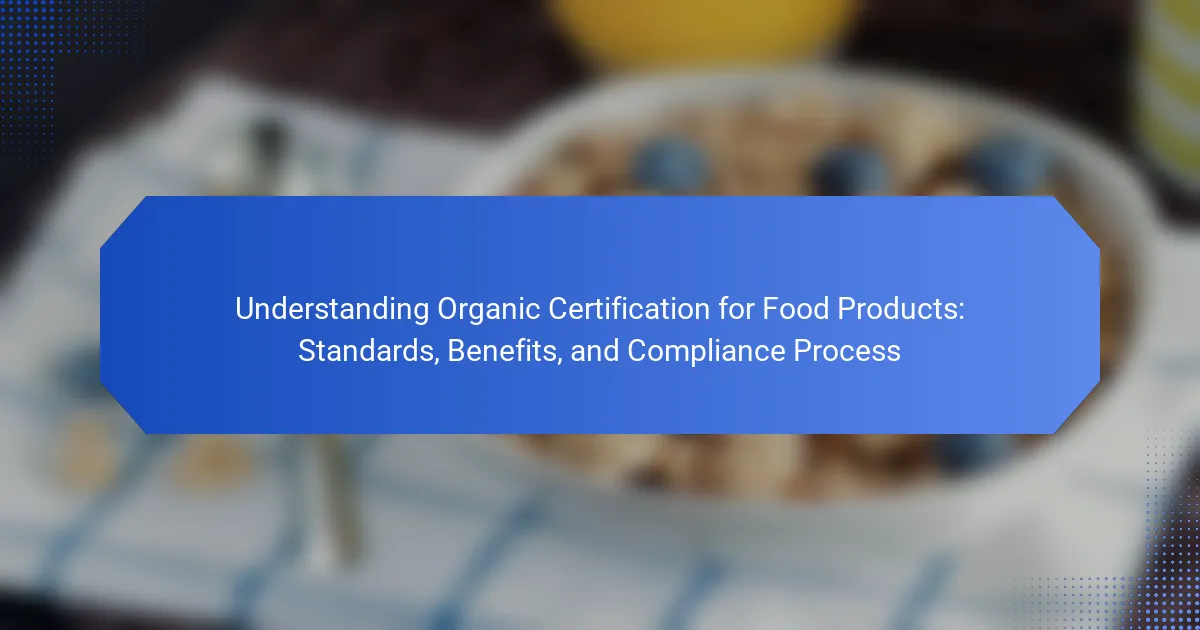IFOAM Organic Certification Standards establish the criteria for organic farming and production, promoting sustainable agricultural practices worldwide. These standards focus on health, ecology, fairness, and care, ensuring that organic products are free from synthetic fertilizers, pesticides, and genetically modified organisms (GMOs). The certification process involves rigorous inspections to maintain consumer trust and is recognized in over 100 countries, enhancing market access for organic producers. The article examines the principles of IFOAM standards, their benefits for producers and consumers, and their significant impact on global organic agriculture, including support for smallholder farmers and contributions to biodiversity and soil health.
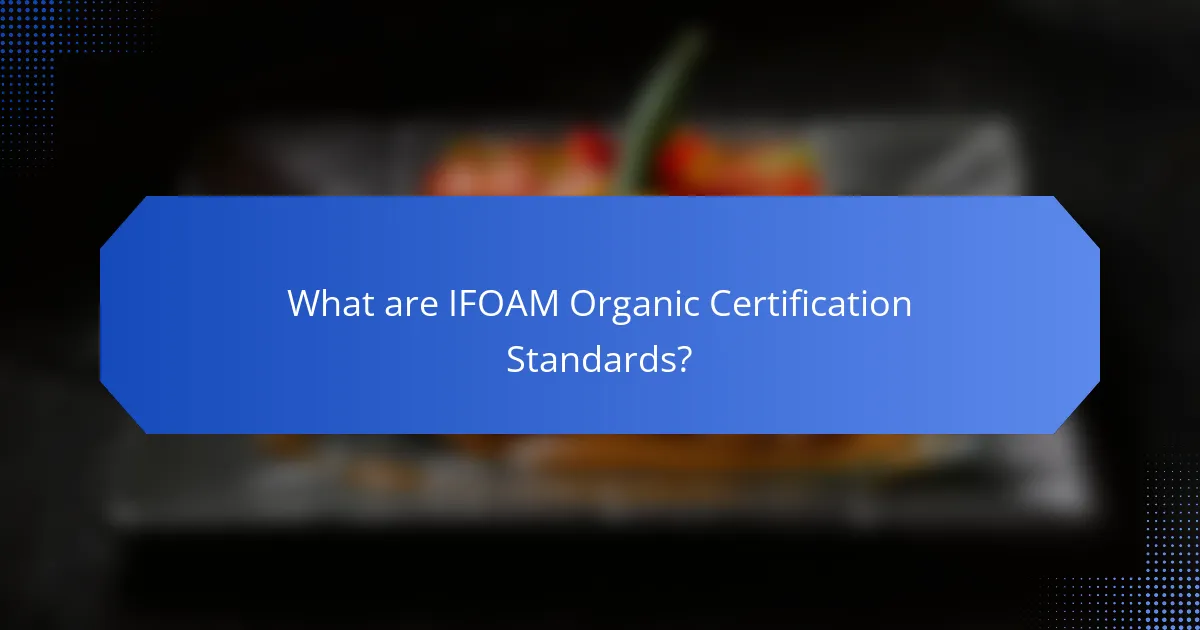
What are IFOAM Organic Certification Standards?
IFOAM Organic Certification Standards define the criteria for organic farming and production. These standards promote sustainable agriculture practices globally. They encompass principles such as health, ecology, fairness, and care. IFOAM standards ensure that organic products are produced without synthetic fertilizers or pesticides. They also require the use of non-GMO seeds and sustainable soil management practices. Certification involves rigorous inspections and compliance with these standards. This process helps maintain consumer trust in organic products. IFOAM standards are recognized in over 100 countries, facilitating international trade in organic goods.
Why are IFOAM Organic Certification Standards important?
IFOAM Organic Certification Standards are important because they ensure the integrity of organic farming practices. These standards provide a framework for sustainable agriculture, promoting environmental health and biodiversity. They help consumers identify products that meet strict organic criteria. Compliance with these standards enhances market access for farmers. It also builds consumer trust in organic products. According to IFOAM, certified organic farms must adhere to specific practices that avoid synthetic pesticides and fertilizers. This commitment contributes to healthier ecosystems and safer food systems. Overall, IFOAM standards play a crucial role in the global organic movement.
What principles guide IFOAM Organic Certification Standards?
IFOAM Organic Certification Standards are guided by four main principles: health, ecology, fairness, and care. The health principle emphasizes the importance of maintaining and improving the health of soil, plants, animals, and people. The ecology principle focuses on fostering biodiversity and ecological balance. The fairness principle ensures that all stakeholders have equitable access to resources and opportunities. The care principle promotes responsible management of resources to protect future generations. These principles are designed to create a holistic approach to organic agriculture, ensuring sustainability and ethical practices.
How do IFOAM standards differ from other organic certification systems?
IFOAM standards differ from other organic certification systems by emphasizing a holistic approach to organic agriculture. They focus on principles such as health, ecology, fairness, and care. IFOAM prioritizes participatory guarantee systems, which promote local involvement in certification. This contrasts with many systems that rely on third-party certifications. Additionally, IFOAM standards are adaptable to local contexts, allowing flexibility in implementation. In contrast, other systems may have rigid criteria that do not account for regional variations. The IFOAM standards also encourage innovation and continuous improvement in organic practices. This is less emphasized in other certification frameworks, which may focus more on compliance. Overall, IFOAM’s unique approach fosters sustainability and community engagement in organic farming.
How do IFOAM Organic Certification Standards promote sustainability?
IFOAM Organic Certification Standards promote sustainability by establishing guidelines that prioritize ecological balance. These standards encourage practices that enhance soil health, reduce chemical inputs, and protect biodiversity. They require farmers to implement crop rotation and cover cropping, which improve soil structure and fertility. Additionally, the standards mandate the use of organic fertilizers and pest control methods, minimizing environmental harm. Compliance with these guidelines leads to reduced greenhouse gas emissions and promotes carbon sequestration. Studies show that organic farming can increase biodiversity on farms, supporting a wider range of plant and animal species. Overall, IFOAM standards drive sustainable agricultural practices that benefit the environment and society.
What practices are encouraged by IFOAM standards for environmental protection?
IFOAM standards encourage practices that promote environmental protection in organic farming. These practices include maintaining soil health through organic matter management. They also emphasize the importance of biodiversity conservation on farms. Crop rotation is encouraged to prevent soil depletion and pest buildup. The use of natural pest control methods is recommended to reduce chemical inputs. Water conservation practices are also highlighted to protect water resources. Additionally, IFOAM advocates for agroecological approaches that enhance ecosystem services. These practices collectively contribute to sustainable agricultural systems and environmental stewardship.
How do these standards support biodiversity and soil health?
IFOAM Organic Certification Standards support biodiversity and soil health through practices that promote ecological balance. These standards encourage crop rotation, which enhances soil fertility and structure. They also prohibit synthetic pesticides and fertilizers, reducing chemical runoff and protecting non-target species. The standards advocate for the use of organic matter, such as compost, to improve soil health and microbial activity. Additionally, they require the preservation of natural habitats, which fosters diverse ecosystems. Research indicates that organic farming can increase species richness by up to 30% compared to conventional methods. This holistic approach ensures sustainable agricultural practices that benefit both biodiversity and soil health.
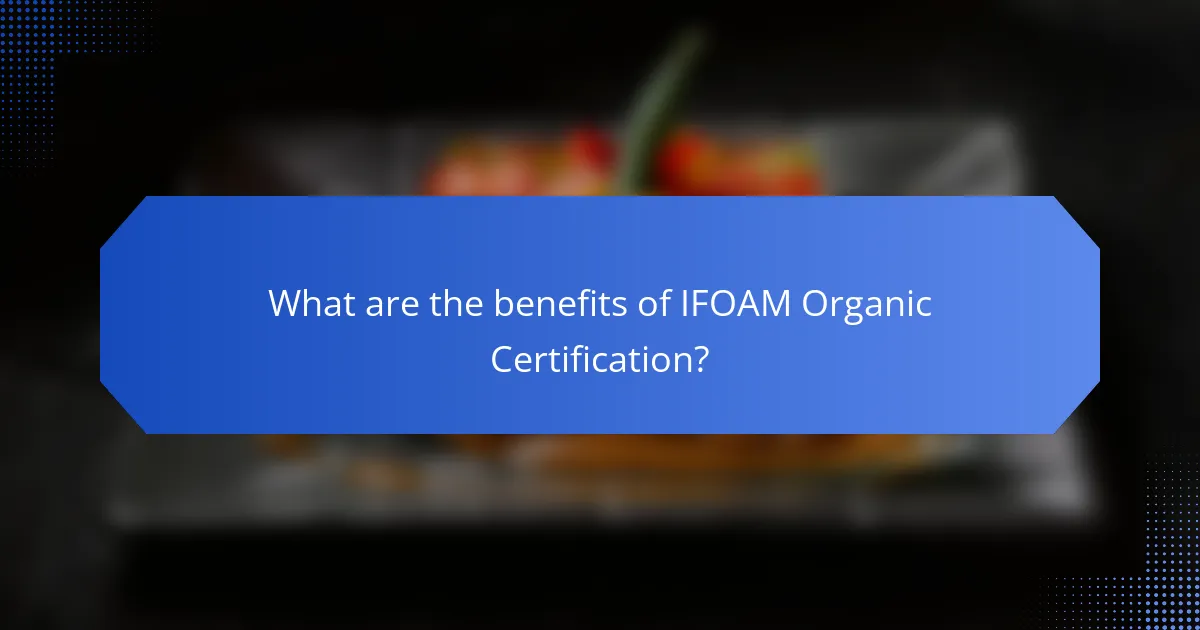
What are the benefits of IFOAM Organic Certification?
IFOAM Organic Certification provides numerous benefits for producers and consumers. It enhances market access for organic products. Certified products often command higher prices due to consumer demand for verified organic goods. The certification also builds trust with consumers by ensuring adherence to strict organic standards. Furthermore, it supports sustainable farming practices that benefit the environment. IFOAM certification can improve farm management and productivity through better resource use. Additionally, it fosters a sense of community among certified producers. The global recognition of IFOAM certification helps in establishing a reputable brand image. These benefits collectively contribute to the growth of the organic sector.
How does IFOAM certification impact farmers and producers?
IFOAM certification positively impacts farmers and producers by enhancing market access and improving product quality. Certified farmers often gain a competitive advantage in the organic market. This certification assures consumers of compliance with international organic standards. As a result, farmers can command higher prices for their products. Additionally, IFOAM certification promotes sustainable farming practices. This leads to improved soil health and biodiversity on farms. Studies show that certified organic farms can yield comparable results to conventional farms over time. Overall, IFOAM certification supports economic viability for farmers and contributes to environmental sustainability.
What economic advantages do certified organic producers experience?
Certified organic producers experience higher market prices for their products. This premium pricing occurs because consumers are willing to pay more for organic goods. In many cases, organic products can sell for 20% to 100% more than conventional items. Additionally, certified organic producers often benefit from increased demand. The organic market has seen consistent growth, with sales reaching $55.1 billion in the U.S. in 2019. Access to niche markets further enhances profitability for these producers. Many consumers specifically seek out organic options, leading to loyal customer bases. Organic producers may also qualify for government subsidies and grants, improving their financial stability. Overall, these economic advantages contribute to the sustainability and growth of organic farming operations.
How does certification enhance market access for organic products?
Certification enhances market access for organic products by establishing credibility and trust with consumers. Certified organic products meet specific standards that assure buyers of their quality and environmental sustainability. This certification often opens doors to larger retail markets and export opportunities. For instance, many countries require organic certification for products to be sold as organic. According to the USDA, certified organic products can access premium pricing and broader distribution channels. Additionally, certification can help producers differentiate their products in a competitive market. The demand for organic products continues to grow, with global sales reaching $120 billion in 2019, indicating the importance of certification in capturing market share.
What benefits do consumers gain from IFOAM Organic Certification?
Consumers gain several benefits from IFOAM Organic Certification. This certification ensures products are produced without synthetic fertilizers or pesticides. It promotes environmentally sustainable practices. Consumers can trust that certified products meet strict organic standards. These standards often include biodiversity and soil health requirements. The certification also enhances food safety by reducing chemical residues. Additionally, consumers support ethical farming practices through their purchases. Overall, IFOAM certification helps consumers make informed choices that align with their values.
How does IFOAM certification ensure product quality and safety?
IFOAM certification ensures product quality and safety through rigorous standards and guidelines. These standards require adherence to organic farming practices, which promote environmental sustainability. Certified producers must implement practices that prevent contamination from synthetic pesticides and fertilizers. Regular inspections by accredited bodies verify compliance with these standards. This process includes reviewing farming methods, soil health, and production practices. Additionally, IFOAM emphasizes transparency in the supply chain. This transparency helps consumers trace the origins of their products. Overall, the certification process builds trust in organic products by ensuring they meet strict quality and safety criteria.
What role does consumer trust play in the organic market?
Consumer trust is crucial in the organic market. It influences purchasing decisions and brand loyalty. Research indicates that 75% of consumers prioritize trust when choosing organic products. Trust enhances perceived product quality and safety. Certifications, like IFOAM, play a significant role in building this trust. They assure consumers about the authenticity and integrity of organic claims. A study by the Organic Trade Association shows that transparency increases consumer confidence. Higher trust levels lead to increased market growth and consumer engagement.
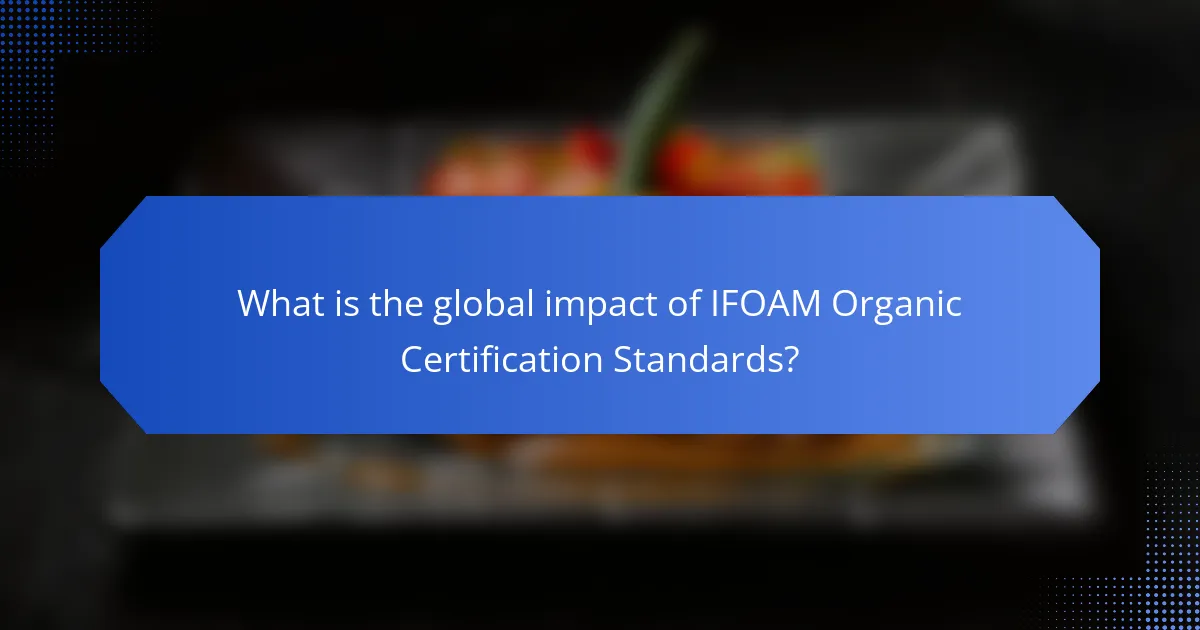
What is the global impact of IFOAM Organic Certification Standards?
IFOAM Organic Certification Standards significantly influence global organic agriculture practices. These standards promote sustainable farming methods worldwide. They enhance market access for organic producers in different countries. IFOAM certification fosters consumer trust in organic products. According to the IFOAM Organics International report, certified farms contribute to biodiversity and soil health. The standards encourage adherence to ethical practices in food production. They also support smallholder farmers by improving their livelihoods. Overall, IFOAM standards help shape policies that favor organic agriculture globally.
How do IFOAM standards influence international organic farming practices?
IFOAM standards significantly influence international organic farming practices by providing a globally recognized framework for organic agriculture. These standards ensure consistency in organic certification across various countries. They promote sustainable farming techniques that enhance environmental health and biodiversity. IFOAM standards also guide farmers in adopting practices that improve soil fertility and reduce chemical usage. By adhering to these standards, farmers gain access to international markets, as consumers increasingly demand certified organic products. Research shows that adherence to IFOAM standards can lead to improved farm profitability and sustainability. Thus, IFOAM’s influence shapes the practices and policies of organic farming worldwide.
What are the challenges faced by countries adopting these standards?
Countries adopting IFOAM Organic Certification Standards face several challenges. One major challenge is the lack of infrastructure for organic farming. Many countries do not have the necessary facilities for processing and certifying organic products. This can hinder the growth of organic agriculture.
Another challenge is the need for training and education. Farmers must understand organic practices and standards. Without proper training, compliance becomes difficult.
Regulatory frameworks also pose a challenge. Many countries have different agricultural regulations. Aligning these with IFOAM standards can be complex and time-consuming.
Financial constraints are significant as well. Transitioning to organic farming often requires investment. Many farmers may lack the funds to make this transition.
Market access is another issue. Organic products often face barriers in reaching consumers. This can limit the profitability of organic farming.
Finally, there is consumer awareness. In some regions, consumers may not understand the benefits of organic products. This can affect demand and slow down the adoption of organic standards.
How does IFOAM certification contribute to global food security?
IFOAM certification contributes to global food security by promoting sustainable agricultural practices. These practices enhance soil health, increase biodiversity, and reduce dependency on chemical inputs. Improved soil health leads to better crop yields and resilience against climate change. Biodiversity supports ecosystem services essential for food production. Reduced chemical dependency minimizes environmental pollution and health risks. The IFOAM standards encourage local food systems, enhancing community access to fresh produce. By fostering organic farming, IFOAM certification helps ensure a stable and secure food supply. Studies show that organic farms can produce yields comparable to conventional farms while supporting ecological balance.
What role does IFOAM play in promoting organic agriculture worldwide?
IFOAM plays a crucial role in promoting organic agriculture worldwide. It serves as the international umbrella organization for the organic movement. IFOAM unites various stakeholders, including farmers, processors, and retailers. It advocates for organic practices through policy development and education. The organization also sets international organic standards. These standards guide certification processes globally. IFOAM’s initiatives help to increase consumer awareness and demand for organic products. Additionally, it fosters collaboration among organic stakeholders to enhance sustainability in agriculture.
How does IFOAM support education and training for organic farmers?
IFOAM supports education and training for organic farmers through various initiatives and programs. It provides resources, guidelines, and training materials tailored for organic agriculture. IFOAM also facilitates workshops and seminars that enhance farmers’ knowledge and skills. Additionally, it promotes networking opportunities among farmers and experts in the organic sector. IFOAM’s global outreach ensures access to best practices and innovations in organic farming. Collaborations with local organizations further strengthen training efforts in diverse regions. This comprehensive approach enhances the capacity of organic farmers worldwide.
What initiatives does IFOAM undertake to expand organic farming globally?
IFOAM undertakes various initiatives to expand organic farming globally. These initiatives include promoting organic agriculture through advocacy and policy development. IFOAM supports capacity building for farmers and organizations involved in organic practices. They also facilitate knowledge sharing and education on organic farming techniques. IFOAM works on creating standards and guidelines for organic certification. They engage in international collaborations to enhance organic market access. Additionally, IFOAM conducts research to support sustainable organic practices. Their efforts aim to increase the adoption of organic farming worldwide.
What best practices should be followed for successful IFOAM certification?
Successful IFOAM certification requires adherence to specific best practices. First, ensure compliance with IFOAM’s organic standards. This includes following guidelines on organic farming methods and inputs. Second, maintain thorough documentation of all farming practices. Accurate records support transparency and traceability. Third, engage in regular training for staff on organic practices. Continuous education helps maintain high standards. Fourth, conduct internal audits to assess compliance. Regular self-evaluation can identify areas for improvement. Fifth, establish a clear communication plan with stakeholders. Effective communication fosters trust and collaboration. Finally, stay updated on changes to IFOAM standards. Adapting to new requirements is crucial for ongoing certification. These practices collectively enhance the likelihood of successful certification.
IFOAM Organic Certification Standards are a comprehensive framework that defines the criteria for organic farming, emphasizing principles such as health, ecology, fairness, and care. This article analyzes the significance of these standards in promoting sustainable agricultural practices, enhancing market access for producers, and fostering consumer trust. Key topics include the environmental benefits of IFOAM standards, their role in supporting biodiversity and soil health, and the economic advantages for certified organic producers. Additionally, the article explores the global impact of IFOAM certification, the challenges faced by countries adopting these standards, and the initiatives undertaken by IFOAM to expand organic farming worldwide.
